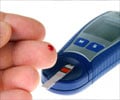A leading diabetologist, Dr. Vikas Ahluwalia, has said people suffering from diabetes need to be aware of the dangers and risks posed by metabolic syndrome.
A leading diabetologist, Dr. Vikas Ahluwalia, has said people suffering from diabetes need to be aware of the dangers and risks posed by metabolic syndrome, but adds that while it is a lifelong condition, lifestyle changes can help to reverse it or reduce the risk factors.
Dr. Ahluwalia, who is the president of the Diabetes Care Foundation of India, says that first there is a need to undertsnad what is metabolic syndrome."Metabolic syndrome stands for a group of risk factors closely associated to obesity, that increases the risk for heart disease, diabetes and stroke. The term "metabolic" refers to the biochemical processes involved in the body's normal functioning. In general, a person with metabolic syndrome is twice as likely to develop heart disease and five times as likely to develop diabetes as someone without metabolic syndrome," says Dr. Ahluwalia.
According to the National Cholesterol Education Program's Adult Treatment Panel III report, there are seven factors that contribute to metabolic syndrome.
They are:
(1) Abdominal Obesity waist circumference Greater than 35 inches in women and Greater than 40 inches in men. This form of obesity is most strongly associated with metabolic syndrome;
(2) Blood Pressure Greater than 130/85 mm Hg or more. High blood pressure and obesity are strongly associated with each other;
(3) Insulin Resistance - cells of overweight and obese persons show poor response to insulin. Insulin resistance can lead to diabetes;
(4) Triglycerides Greater than 150 mg/dl;
(5) HDL cholesterol (the "good" cholesterol) Less than 40 mg/dl in men and Less than 50 mg/dl in women;
(6) Pro-inflammatory state - indicated by raised C-reactive protein (marker of inflammation) levels in blood and
(7) Pro-thrombotic state - elevated blood clotting factors.
According to Dr. Ahluwalia, the risk factors most closely associated with metabolic syndrome include-
(1) Age - the incidence of metabolic syndrome increases with age;
(2) Ethnicity African Americans and Mexican Americans are more prone to metabolic syndrome, so are South Asians;
(3) Body mass index (BMI) > 25;
(4) Personal or family history of diabetes/gestational diabetes;
(5) Smoking;
(6) Heavy drinking;
(7) Stress;
(8) Post-menopausal status;
(9) High-fat diet and
(10) A sedentary lifestyle
Advertisement
A large waistline.
Advertisement
HDL cholesterol less than 50 mg/dL in women and less than 40 mg/dL in men.
Blood pressure greater than 130/85. If only one of your two blood pressure numbers is high, it's still a risk factor for metabolic syndrome.
Fasting blood sugar between 100 and 125 mg/dL is considered prediabetes. Fasting blood sugar = 126 mg/dL or higher is considered diabetes. A fasting blood sugar of 100 mg/dL or higher (prediabetes or diabetes) is a component of metabolic syndrome.
Dr. Ahluwalia says therapeutic lifestyle changes which include weight loss, increased physical activity, an improved diet, and smoking cessation, recommended for avoiding onset of metabolic syndrome.
He says medicines are the next line of treatment, medicines that target individual risk factors like high blood pressure, high triglycerides, low HDL cholesterol, and high blood sugar. Aspirin may be used to reduce the risk of blood clots, a condition that often occurs with metabolic syndrome.
Metabolic syndrome can be prevented by making healthy lifestyle choices.
"Maintaining a healthy weight is important. Regularly monitor your waist circumfrence and body mass index (BMI)," is advisable says Dr. Ahluwalia.
He also says that overeating should be avoided and recommends frequent and low calorie meals, meals that are low in saturated fat. There is also a need to incorporate more of whole grains, fish, and fruits and vegetables, he adds.
Increasing physical activity can also help maintain a healthy weight.
"If you're medically able, get at least 30 minutes of moderate activity, such as brisk walking, at least five days a week.
With your doctor's permission, work up to getting 60 minutes of moderate activity 5 to 7 days a week. Make sure to schedule regular doctor visits to keep track of your cholesterol, blood pressure, and blood sugar levels," Dr. Ahluwalia concludes.
Source-ANI
SRM















